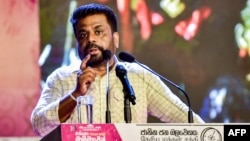Sri Lanka will choose a new parliament Thursday in an election that is seen as crucial for the country’s new left-leaning president, Anura Kumara Dissanayake, who swept to power in September on an anti-corruption platform amid a wave of dissatisfaction with established political parties.
Dissanayake’s National People's Power (NPP) coalition currently has only three seats in the 225-member parliament, constraining his ability to usher in the systemic changes he says are necessary to tackle corruption and improve economic conditions for the working class.
Aiming to boost the NPP’s representation, Dissanayake dissolved parliament soon after he was voted into power and called for snap polls a year ahead of schedule.
Analysts say the strong support that Dissanayake secured in the presidential election seven weeks ago will likely stay with his party in Thursday’s election.
“He got 42 percent of the vote, which is a dramatic leap for a representative of a fringe party which had only secured three to four per cent vote share in any election in the past,” Kusal Perera, political analyst in Colombo told VOA. “That vote will come back in the parliamentary elections, though it may be slightly lesser this time.”
Current cabinet: 3
The 55-year-old president, popularly known as AKD, is seeking a two-thirds parliamentary majority so he can push through his promised reforms. Currently, the Sri Lankan leader has the smallest cabinet in the country’s history — Prime Minister Harini Amarasuriya, and two ministers. In Sri Lanka, only lawmakers can be appointed as ministers.
His hopes of gaining a much bigger share of parliamentary seats for his coalition rest on voters rejecting parties that governed the country for decades but are blamed by many people for misgovernance and corruption.
The country is still grappling with a severe economic downturn two years ago. Although former president Ranil Wickremesinghe is credited with stabilizing the economy after securing a $2.9 billion loan from the International Monetary Fund, the austerity measures he introduced – mainly an end to public subsidies – led to sharp price hikes in food and fuel that have caused hardship for millions of Sri Lankans.
Dissanayake has said he will renegotiate the terms of the IMF bailout package to ease the austerity measures that were imposed to secure the loan.
Ahead of Thursday’s elections, the new president has sounded an optimistic note. "In past elections, people did not have confidence in us but in September people gave us victory and proved that we are a winning party and we can form a government," he said during a campaign rally on Sunday. "The next task is to unite people from the four corners of this country and build a powerful people's movement."
The NPP’s main challengers are the Samagi Jana Balawegaya, led by opposition leader Sajith Premadasa, and the New Democratic Front (NDF), which is backed by former president Ranil Wickremesinghe.
But the opposition has run a lackluster campaign. “There has been no focus on what they want or the program that they want to push,” said Perera.
The country’s powerful Rajapaksa political dynasty, which played a key role in Sri Lanka over the last two decades, has not fielded a candidate in the parliamentary polls.
Gotabaya Rajapaksa, who was the president when the economy collapsed, was ousted by a massive popular protest movement in the country that demanded, among other things, that people guilty of corruption be punished.
Just like the presidential polls, the parliamentary election is seen as a referendum on people’s desire for change in the political landscape. However, there is less enthusiasm this time around, according to some residents.
“Nobody is very excited about the election partly because most people think that it is a given that Dissanayake’s NPP is going to win,” says Chameera Dedduwage, a professional based in Colombo who took part in the protest movement against Rajapaksa. “They feel that they deserve to be given a chance to prove themselves and bring about the system change they have promised.”




